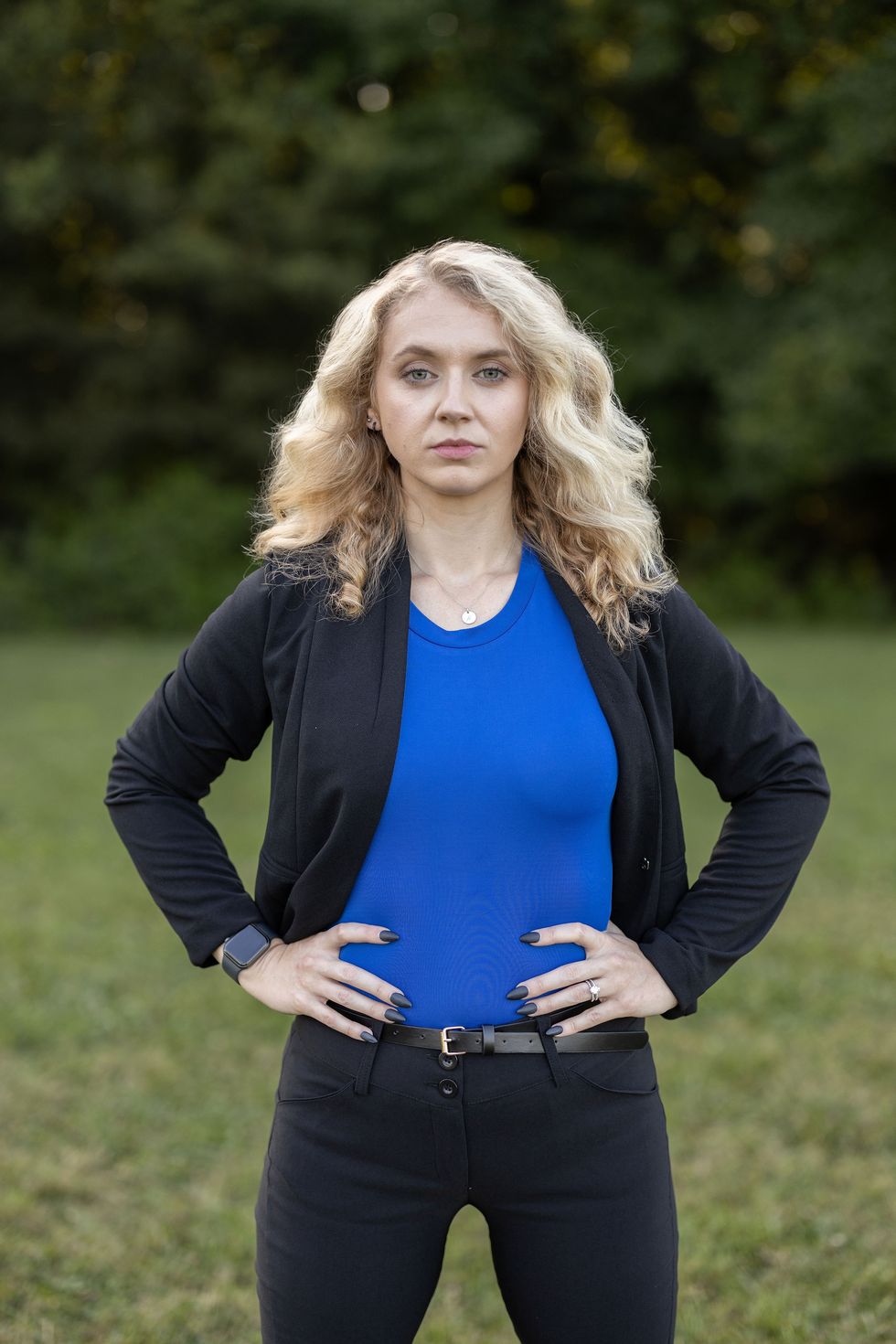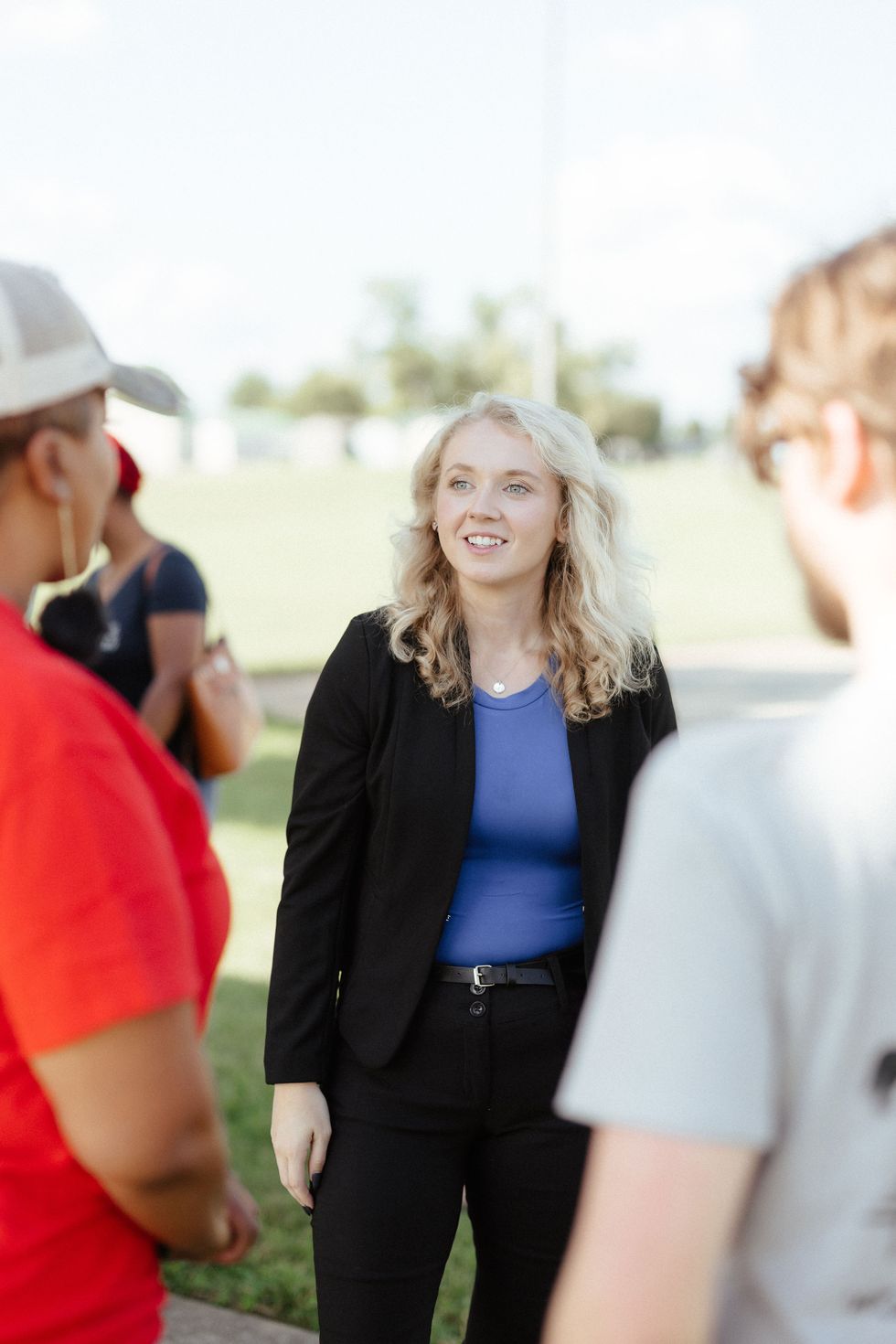Allie Phillips Went Viral on TikTok After She Was Denied an Abortion. Now, She’s Running for Office.
Allie Phillips cried into the camera. Her face mask was pushed down around her chin, and tears streamed from her big blue eyes. It was March 7, 2023, and she was speaking to her more than 330,000 TikTok followers from an abortion clinic thousands of miles away from her home state of Tennessee. “I didn’t expect to have this update,” Phillips said into the camera, barely able to get out the words.
Two weeks earlier, at 19 weeks pregnant, doctors discovered that Phillips’ baby, whom she’d named Miley, was suffering from a multitude of fatal health issues and no longer compatible with life. Continuing the pregnancy put Phillips’ own life at risk, but her doctors couldn’t do anything because of Tennessee’s abortion ban. After researching out-of-state options, Phillips booked an appointment in New York City. When she arrived, an ultrasound at the clinic found that Miley had already died, a development that meant Phillips was at risk of going into sepsis, among a host of other serious health risks. Providers scheduled her for an emergency procedure. “It was very traumatic,” she says.
Back home in Tennessee, Phillips took off work and stayed in bed “debating if my life was worth living or not,” she says. “It felt like every ounce of happiness I had was ripped away.” Phillips found solace in an unlikely place: the comments section of her TikTok videos. “Knowing that my story was touching so many hearts made me feel like Miley didn’t pass in vain,” she explains.
Six months after going public with her abortion story, Phillips decided to run for the House of Representatives of District 75 in Tennessee. She announced her candidacy, where else, on TikTok. “It’s a way for me to accept what I went through and turn my pain into a purpose for other women,” she says.
Most politicians use TikTok to reach voters, but Phillips is taking her TikTok followers into politics. The 28-year-old is part of a wave of influencers using their personal stories and, well, their influence to run for office. Not only is Phillips a new brand of TikToker-turned-politician, she is also one of the first candidates in the post-Roe era to run for office after being denied an abortion in her home state. And, like any good influencer, she’s taking her followers along for the ride.
It was hard for me to watch Phillips’ abortion videos on TikTok without crying. Her story reminded me of my own from four years ago. At 12 weeks pregnant, my baby boy tested positive for Trisomy 13, a chromosomal abnormality that results in severe physical abnormalities and mental disabilities. Given that my first pregnancy went smoothly, I was oblivious to any other possibility, until I saw him motionless on the ultrasound screen. I underwent a “dilation and curettage” procedure, otherwise known as a D&C, shortly after and spent the following weeks overwhelmed by grief. No pregnancy or loss is the same, but when I watched Phillips crying from the floor of the abortion clinic, I knew how she felt. I also knew she faced many more obstacles than I did.
Just as mine had, Phillips’ whole world crashed down around her after the procedure. It didn’t help that when she came home from New York, strangers online provided unsolicited advice. Some accused her of being a murderer, and still do to this day. Instead of letting it go, Phillips let her followers know about the trollish comments. “I wanted to share what it’s like when you publicly tell a story, what kind of backlash you get, what kind of hate you get, simply because I decided to make a healthcare decision for myself,” she says. “I [share] to make sure [other women] know they’re not alone in this process, that there’s just trolls on the internet and they’re going to come for you if you go public with anything.”
One month later, the Center for Reproductive Rights reached out asking if Phillips would consider joining a lawsuit challenging the abortion ban in Tennessee. For the first time in weeks, she felt hopeful. “I knew this was going to be my opportunity to just take care of Miley and her name and what we went through,” Phillips says. “I wanted to make sure that her story was shared.”
As the lawsuit progressed in Tennessee, Phillips was inspired to work on her own piece of legislation behind the scenes to ensure that pregnant women in Tennessee would have access to medically necessary abortion care. After reaching out to state lawmakers for help, Phillips finally secured a sit-down with Jeff Burkhart, the Republican representative from her district. But the meeting didn’t go as she had hoped. Phillips left feeling uninspired. “[I thought to myself], you are voting on women’s reproductive healthcare laws and know absolutely nothing about women’s reproductive health,” she says.
Over the next few weeks, Phillips weighed the idea of a bid against Burkhart in the November 2024 Tennessee election cycle. She already had a built-in platform on TikTok and a mission to protect women’s reproductive rights. When news broke about a 10-year-old in Ohio who had been raped and had to leave her home state for an abortion, Phillips felt “sick to my stomach,” she says. “I couldn’t imagine the trauma and pain she and her family have gone through.” Philips, who has a six-year old daughter named Adalie, says she “realized that nobody is going to fight for our kids like us moms will.” In October 2023, she launched her campaign.
The Tennessee ban has energized “a new generation of women candidates,” says James Kent Syler, a professor of Political Science and Public Policy at Middle Tennessee State University. That energy seems to be trickling out across the country, as states continue to pass restrictive abortion measures. In the first three days after Roe was overturned, more than 1,200 people registered to run for office with Run for Something, an organization that helps young progressives seek office, compared to the 250 people who, on average, sign up weekly with the organization, all around the country.
Last year, Louisiana mom Nancy Davis found out that her 10-week-old fetus had developed acrania, a rare congenital disorder where there is no fetal skull. Because of her state’s restrictive laws, Davis flew to New York for an abortion. Like Phillips, she also decided to share her story publicly and is now planning to run for office in Louisiana next year. “Women who have experienced abortion denials have firsthand knowledge of the challenges and the emotional, physical, and financial burdens associated with those very, very restrictive policies,” she says.
Phillips wants to use that knowledge to create change, and she sees TikTok as the tool to get her there. The video app, which now has 150 million American users, is one of the most powerful platforms in politics right now. It helps candidates replicate the intimacy of traditional campaign tactics like door knocking, without actually doing any of the work of traditional campaign tactics. “You can build a para-social relationship with someone,” explains Amanda Litman, co-founder and co-executive of Run for Something.
A large TikTok following also helps candidates raise funds and reach constituents they might never have been able to before. “There is a rising cohort of younger politicians who are able to use social media in an authentic way, and that can be really beneficial for them as they start political careers,” says Maggie Macdonald, an assistant professor of political science at the University of Kentucky. Take, for example, last year’s Miss Texas Averie Bishop, who has over 830,000 followers on TikTok and recently announced her decision to run as a Democrat for House District 122 in Texas in 2024. Or Jess Piper, who has over 112,000 followers on TikTok, and ran for the Missouri House of Representatives in 2022. “I ended up raising more money than any candidate in the entire state of Missouri that was running for House seat,” Piper says.
Like most influencers, Phillips’ TikToks have evolved over the years. Her first video from April 2020 was a dance to “Come Around Me” by Justin Bieber. Later that year, she started sharing updates about her beloved cat of nine years, who was rushed to the ER after having trouble breathing. As her follower count grew, Phillips’ page became more personal. There were videos about her gastric sleeve surgery and later, her trip to New York City. “I wasn’t making it to get viral views,” Phillips says. “I’ve always been super open about everything. I try to be as transparent as I can be.”
Today, many of her videos are campaign-focused. At a time when reproductive rights are on the line, she knows there’s power behind making the personal political. “A lot of people say, ‘Just move to a blue state,” she says. “But I don’t hide and go into a corner just because I’m scared.” That’s not Phillips’ style. Instead, she’ll turn the brightness up on her ring light, hit record, and continue to speak out.
Katie C Reilly is a freelance writer based in Oakland, CA. Her writing primarily focuses on women’s health, mental health and parenting and has appeared in The Washington Post, The New York Times Magazine, Parents Magazine and Newsweek, among other publications.



